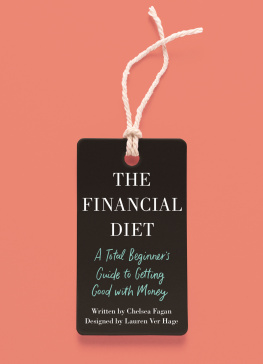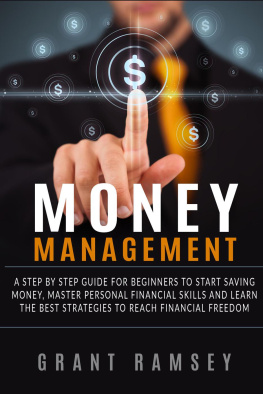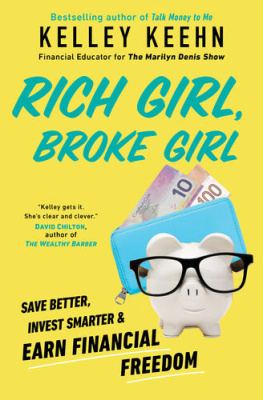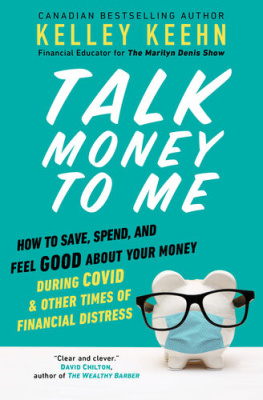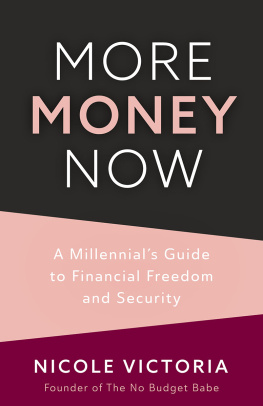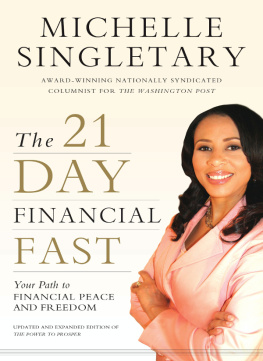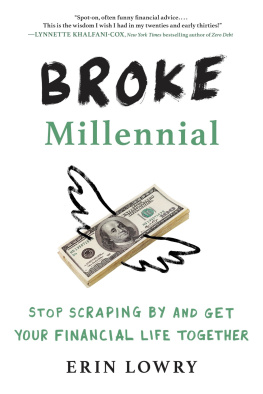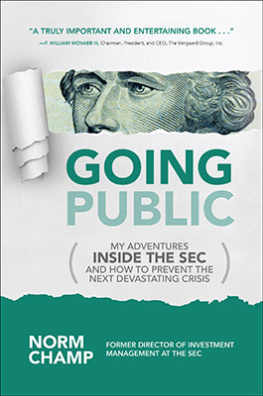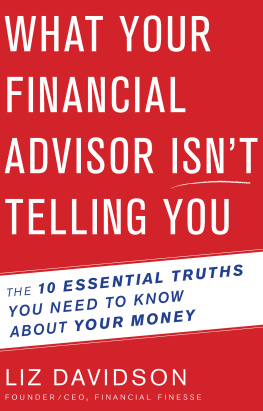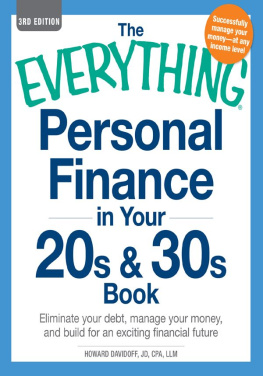The author and publisher have provided this e-book to you for your personal use only. You may not make this e-book publicly available in any way. Copyright infringement is against the law. If you believe the copy of this e-book you are reading infringes on the authors copyright, please notify the publisher at: http://us.macmillanusa.com/piracy.
Saving money isnt about depriving yourself. Its about deciding you love Future You as much as you love Today You.

I graduated from high school when I was seventeen years old. The subprime mortgage crisis hadnt yet happened, and it was a very good time to be a teenager who was irresponsible with money. When bankers werent standing on the roof of their branches and throwing loans at anyone who walked by, they were going into the high schools to find unsuspecting teens to ask them if they wanted a credit card. And looking back, when you compare the potential implications of a starter credit card to the student loans those same kids were signing on to, getting a Visa with a $500 limit was probably the least of their worries, but still, handing out a credit card to someone whose primary life skills education came from episodes of Degrassi still seems pretty cruel. Of course we all wanted free money, and of course we were going to pay it back on time. We were teenagers, and we had zero concept of fiscal responsibility and every interest in instant gratification. I was definitely one of those teenagers.
The day I turned eighteen, I acquired my little card full of free money, and maxed it out within a month and a half of delirious spending. Once swiping it no longer provided me with the sweet, sweet Forever 21 dresses my body craved, I tossed that bad boy into the garbage and ignored the increasingly urgent notices that arrived in the mail. After all, I had a savings account with thousands of dollars from my summer jobs to blow through. You couldnt touch Teenage Chelsea!
By the time the financial crisis hit in 2008, and banks were no longer the tire fire of free money they once were, Id already defaulted on my card (which meant tanking my credit score and being hounded by collection agencies), blown through my savings, and was left with absolutely zero resources when it came time to get my shit together and start community college. But because my parents put a significant amount of caveats on any potential loan cosigning (excellent grades job-ready majors, prestigious yet inexpensive schools), I ended up going to France for school instead of somewhere in the United States when it came time to transfer from community collegein France, I didnt need them.
Looking back, I am grateful they prevented me from signing on the dotted line for the $50,000-per-year dream school I desperately wanted to attend. I came out of my education with just a few grand in subsidized government loans, which I went on to pay off in minuscule amounts each month. Sure, I have no degreeI was lucky to be hired at my first full-time job before I finished school in Francebut given how I started, I consider myself lucky to be where I am today.
It was nuts that as a dumb teenager I was allowed to make enormous financial decisions that would impact the rest of my adult life. I wasnt equipped to pick a color scheme for my wardrobe, let alone determine what my budget would look like twenty years down the road. I mostly have my parents reluctance to cosign a college loan to thank for my relatively healthy finances today, and the luck of landing a job that cut off my education spending early. However, I did have the good sense to pay off that defaulted Visa when I was twenty-two by taking huge chunks out of my first several paychecks and settling with the collection agency for a lower amount. I realize that my problems werent exactly universal, but I also know that navigating the fallout of financial mistakes we make when we are young is pretty much guaranteed. The story of a financially troubled youth is a familiar one, and many people in my generation who did make the decision to go to college are now saddled with five or six figures of student debt before they even get a job.
Its true that the system has just been stacked against us. I mean, if an idiot like me can be doing all right, and my friend from high school who spent half her time getting straight As and the other half volunteering can be in severe debt, nothing means anything anymore. Which is why it can be so easy to just throw our hands up in the air and say fuck it to the idea of ever being good with money. And it doesnt help that the information available about personal finance oscillates between a less fun version of your dad yelling at you about stocks, and tone-deaf articles about #millennials not buying homes (its because we have billions of dollars of student debt, asshole). It often feels easier to just excuse yourself from the conversation.
For me, the rejection of all things #finance and #wealth meant that I also rejected the idea of being a competent adult with some control over her life. Yes, I rented an apartment of my own, had a salary, and even those elusive benefits I heard my parents mention, but that didnt mean I was capable of creating a budget or deciding what to do with the money I actually had. Words like investment and IRA scared the hell out of me, and the only thing I was really capable of doing, money-wise, was hoarding it all in a checking account. Even on the rare occasions that I had what I (humbly) considered to be a lot of money at once, I had no idea how to make my money work for me. In my early twenties, the only actual investment I made was in an Italian designer purse bought in a fugue state in a department store. I managed to make it halfway through the decade without anything concrete to show for it, besides a couple grand in checking and a one-bedroom apartment filled with IKEA furniture.
On paper, though, I had achieved a lot by age twenty-five: I had a job I was proud of, I had a strong relationship and friendships, and the financial indiscretions of my youth were largely behind me. But it dawned on me that I was judging my current self on what were the comically low standards I had set for my former self, and I was allowing myself to believe that not a train wreck was the same as actively good with money. So I started a little Tumblr to track my budget and hold myself accountable. I called it The Financial Diet, because I didnt want to keep treating my financial health the way I was treating my bodyby eating an entire bag of Kettle Cooked Jalapeo Chips at night and then wondering why I felt like Id been punched in the face the next morning. I knew that the key to becoming better with money would only be found through balance and thoughtful decision-making. I also knew that just like I wasnt going to become one of those women who does CrossFit competitions while eight months pregnant, I wasnt going to become some high-powered money manager, either. And beyond establishing a firm foundation with money, in developing The Financial Diet, Ive learned countless surprising things about myself (that I hope will be helpful to you), like its worth it to pay professionals to do shit you dont know how to do and will put off until its too late, and do not fear Excel spreadsheets, for they are your friends. I can say with confidence that today I am much better and smarter when it comes to moneyand the general act of living wellthan I ever was before.

